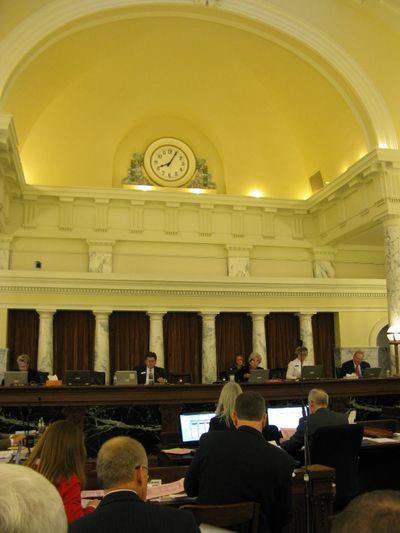Idaho cuts per-bandwidth costs in half by dumping IEN

BOISE – The data is in now from most of Idaho’s school districts, and it wasn’t just North Idaho – school districts across the state are saving big bucks now that they’ve switched from the defunct Idaho Education Network to local broadband vendors for their high school broadband service.
“The cost per megabit was cut nearly in half,” legislative budget analyst Robyn Lockett told legislative budget writers this morning.
The data helped the Joint Finance-Appropriations Committee make a big decision on how to handle school broadband for next year: They’ll keep doing what they’re doing now, rather than try to start up a new statewide contract.
On a unanimous vote, the joint budget committee approved a $6.4 million allocation to the state Department of Education for school broadband service in the fiscal year that starts July 1; school districts will have to take competitive bids and sign their own year-long contracts, then be reimbursed by the state.
Gov. Butch Otter had requested $10.5 million next year for the IEN. But that was before a court declared the state’s $60 million contract with two politically connected vendors illegal. The contract was awarded in 2009 to Nashville-based Education Networks of America and Quest Communications, now CenturyLink. Syringa Networks, an Idaho firm that originally was awarded the contract along with ENA but was cut out of the work by then-state Department of Administration Director Mike Gwartney, sued and won.
With the demise of the network last month, schools scrambled and found their own broadband vendors. At least five North Idaho districts switched to Post Falls-based Ednetics, and ended up with far more bandwidth at a fraction of the price.
Legislative budget writers received a report Monday on 93 of 129 school districts and how they handled the changeover. Just over 50 stayed with ENA, which strongly urged districts to just sign new short-term contracts with it to avoid any service interruptions; all but two of those saw costs either stay the same or rise, with some more than doubling.
School districts that switched to new providers generally saw costs drop and bandwidth increase. Tiny Castleford School District went from $5,165 a month for IEN service of 42 megabits per second to just $600 a month for 50 megabits per second from a local telephone company.
Legislative budget analysts estimated that total state costs dropped by 21 percent, while bandwidth increased. The cost per megabit went from $80.67 under the IEN contract to $43.96.
Sen. Sheryl Nuxoll, R-Cottonwood, noted that three school districts in her legislative district stayed with the previous vendor, Education Networks of America, and saw their costs double.
Lockett said, “In some instances it is higher for the same services. I can’t speak for why districts did that.”
Senate Finance Chairman Dean Cameron, R-Rupert, said, “In some cases they did it just to prevent interrupting service. It is probably the high-water mark.”
He noted that Cassia County, one of the school districts in his legislative district, “found three vendors less expensive, but still stayed with ENA because of the interruption issue, so they will make the transition in the summer.”
JFAC members pointed to some districts that saw dramatically lower costs. The Coeur d’Alene Charter Academy, for example, dropped from $7,577 a month on the IEN to $370 a month from Time Warner Cable, and increased its bandwidth from 18 megabits per second to 50. Fruitland school district switched to Farmer’s Mutual Telephone Co. from the IEN and saw the price fall from $6,788 a month to just $100 for the same bandwidth.
Sen. Jim Guthrie, R-McCammon, said, “It kind of begs the question whether you need a statewide network.” Amid some laughter, Cameron referred to Guthrie as “Captain Obvious.”
Cameron said later that a statewide network could have some advantages. “It’s obvious we’ve been overpaying for the service now, but that was based on the vendors and the contracts that were let six years ago,” he said.
The joint budget committee’s decision to provide funds to the state Department of Education for broadband service next year to distribute to school districts – as it did for the remainder of this year after the IEN contract was declared illegal – is a one-year decision. “For this next year, it says we’re staying on the same path we’re on,” Cameron said, “and we’ll evaluate what to do for 2017.”
Legislative budget writers also pulled five positions out of the state Department of Administration’s budget, which had been allocated to the IEN, and put them in the Department of Education to staff the school broadband program next year.
Meanwhile, the state Department of Administration decided last week to declare an emergency and grant a $1.88 million, no-bid six-month contract to CenturyLink to continue broadband service to 16 state agencies that the department had previously signed up under the IEN contract, though they weren’t part of the school network. When the contract was declared illegal, that service had to be changed.
The move raised eyebrows among lawmakers, who noted that school districts largely managed to meet state contracting requirements and take three bids, even on extremely short notice; fewer than two dozen chose to sign contracts exempted from the bidding rules, though that option was made available to them if needed.
“I think you’ll see a response to that” when JFAC sets the Department of Administration budget on Thursday morning, Cameron said. “We’ll address that for the next year.”